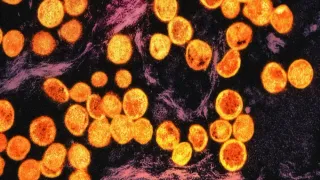October 23, 2014
Most Men Find HIV 'Insignificant' In Their Lives
EDGE null READ TIME: 3 MIN.
The Kaiser Family Foundation has released a new alarming report reflecting gay and bisexual men's attitudes, knowledge, and experiences with HIV/AIDS and new HIV therapies in the United States. Their survey on HIV/AIDS in the lives of gay and bisexual men in the United States reports that 56 percent of gay and bisexual men are not personally concerned about HIV or AIDS affecting them and 30 percent have never been tested for HIV.
"HIV/AIDS might not be a death sentence anymore, but there are still 50,000 new infections in the United States every year-and gay and bisexual men are still among those most at risk," said GMHC CEO Kelsey Louie. "The Kaiser Family Foundation study is a needed wake-up call that communicating the correct information about HIV and AIDS to the public has never been more critical. We must do more to educate our gay and bisexual men about how HIV and AIDS can affect them, and how life-saving medications like PrEP and PEP can help them prevent HIV infections and stay healthy."
Eight out of ten gay and bisexual men surveyed also said that they have heard little or nothing about PrEP, a life-saving medication that can prevent HIV-infections. The Foundation's survey comes on the heels of a new CDC report showing that 58 percent of gay and bisexual men diagnosed with HIV are not virally suppressed.
Highlights of the survey include findings that About half of gay and bisexual men say HIV/AIDS is a "very" or "somewhat" significant issue for them personally (49 percent), while the other half say it is "not too significant" or "not a significant issue" in their lives (51 percent). However, just about a third (35 percent) say they are personally concerned about becoming infected, while more than half (56 percent) say they are not personally concerned.
Just a third of gay and bisexual men realize that new infections are on the rise among gay men. About one in five (22 percent) think rates are decreasing and the rest either think the situation is staying the same or acknowledge that they don't know.
Fewer than half (46 percent) of gay and bisexual men are aware that people with HIV should start antiretroviral (ARV) treatment as soon as they are diagnosed, and only a quarter (25 percent) know about treatment as prevention, or TasP; that is, that taking consistent ARV treatment significantly reduces the risk of passing HIV on to one's sexual partners.
Majorities say that too many gay men not knowing their status (75 percent), complacency about HIV in the gay community (62 percent), and HIV-related stigma (56 percent) are major reasons it's been hard to control the spread of HIV among gay men.
Gay and bisexual men of color are more likely than those who identify as white to say HIV/AIDS is a significant issue for them personally (64 percent versus 42 percent) and that they are personally concerned about becoming infected (53 percent versus 28 percent).
Nearly half of gay and bisexual men ages 35 and older say they have lost someone close to them to the disease, and support the widespread use of PrEP. While younger gay and bisexual men are twice as likely as older men to say they have never been tested for HIV.
This fact notwithstanding, only about a third (35 percent) of gay and bisexual men say they are at least somewhat concerned about becoming infected with HIV, with gay men of color almost twice as likely to be concerned about becoming infected with HIV.
To read the complete report, visit http://kff.org/hivaids/report/hivaids-in-the-lives-of-gay-and-bisexual-men-in-the-united-states/?__hstc=87270983.63408ee80854e5591b674d84afed675e.1411655156395.1411743053625.1411747174053.3&__hssc=87270983.7.1411747174053&__hsfp=3363989213






